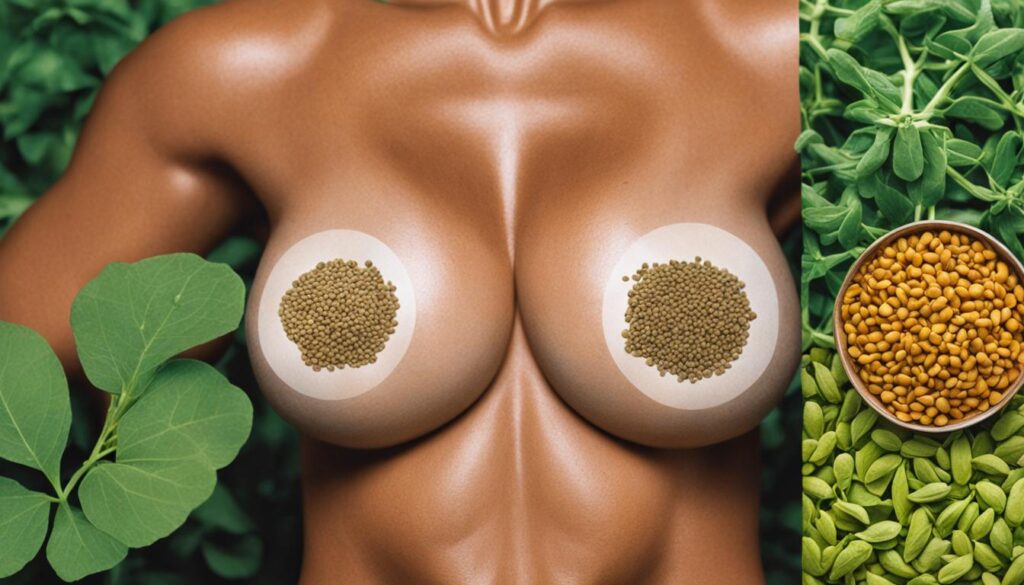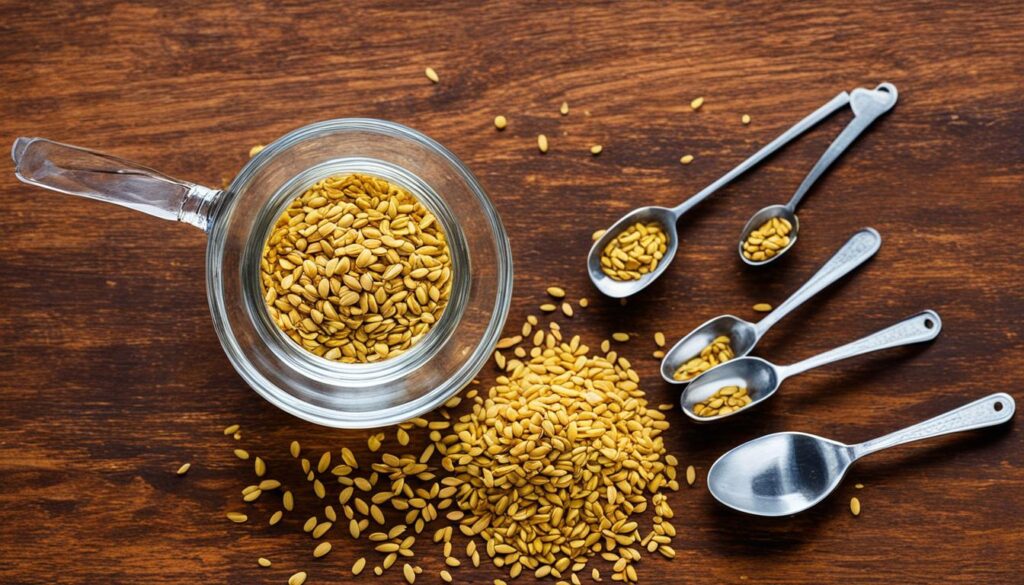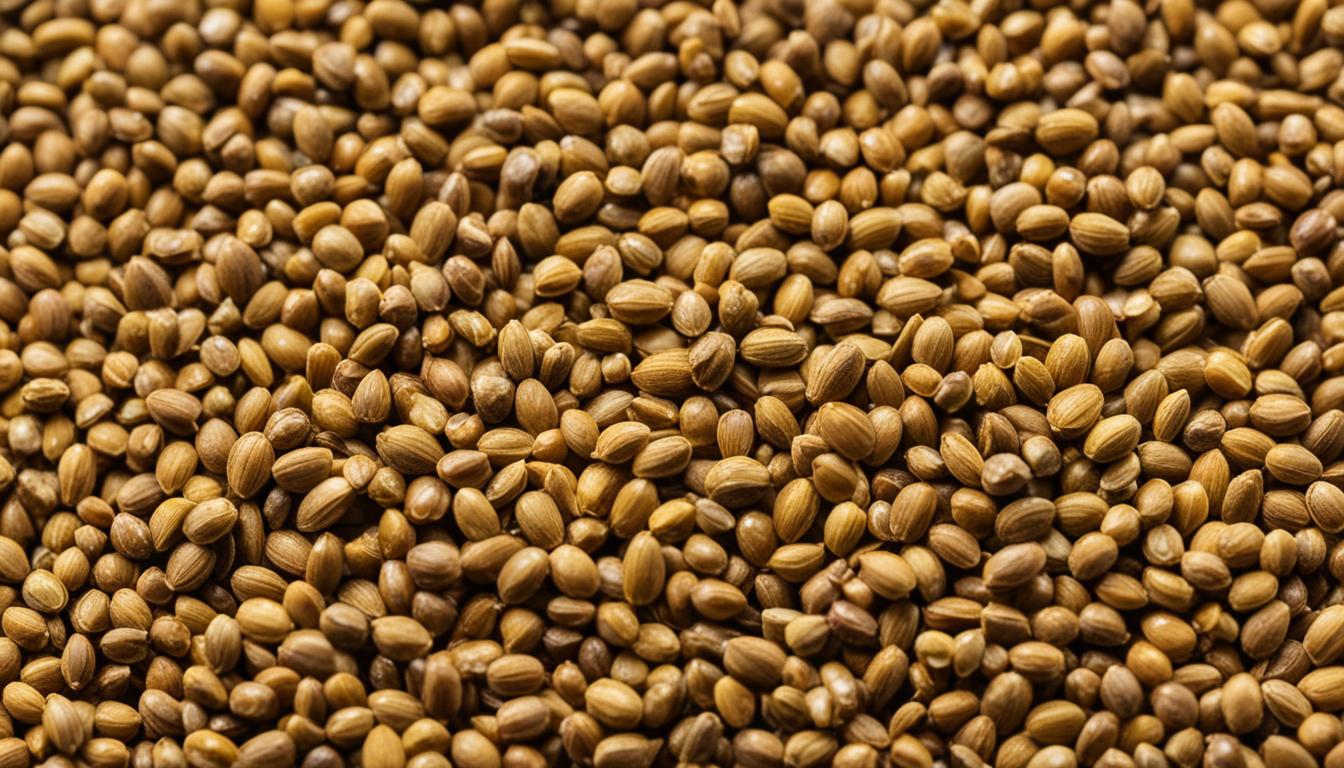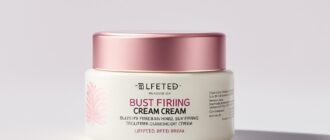The information provided in this article is intended for educational purposes only and should not be construed as medical advice. Although the author is a medical professional, the information presented here does not establish a doctor-patient relationship. Always consult with a qualified healthcare provider before making any decisions about your health or treatment
When it comes to breast size, many individuals are curious about natural methods of enhancing their bust. One such method that has gained attention is the use of fenugreek, a herb commonly used in traditional medicine. Some claim that fenugreek can increase breast size, but is there any truth to this claim? Let’s take a closer look.
Firstly, it’s important to understand that breast size is primarily determined by genetics and the ratio of fat to other breast tissue. While fenugreek does contain compounds that may have hormone-like effects, such as diosgenin, there is no scientific research specifically linking fenugreek consumption to breast enlargement. While fenugreek is known for its potential to increase breast milk production, its impact on breast size remains uncertain.
Nevertheless, fenugreek has a long history of use in traditional medicine for various purposes, such as improving digestion and reducing inflammation. It is also believed to have multiple health benefits and is considered safe for most people. However, more research is needed to fully understand its mechanisms of action and potential breast-related benefits.
Overall, while fenugreek may have potential health benefits, its specific impact on breast enlargement is still unclear. It’s important to manage expectations and consult with healthcare professionals when considering any methods for breast enhancement.
Contents
- 1 The Historical Use of Fenugreek in Medicine
- 2 Understanding Breast Growth: Genetics vs. Lifestyle
- 3 Natural Methods for Enhancing Breast Size
- 4 Role of Hormones in Breast Development
- 5 Scientific Research on Fenugreek and Breast Enlargement
- 6 Nutritional Content of Fenugreek Seeds
- 7 Yoga Poses for Breast Enhancement
- 8 “Fenugreek Increase Breast Size”: Separating Fact from Fiction
- 9 Creams and Lotions: Do They Really Work?
- 10 Fenugreek Consumption: Safe Practices and Recommended Dosage
- 11 Fenugreek Seed Extracts and Oils: Usage and Application
- 12 The Psychological Aspects of Breast Size and Confidence
- 13 Common Myths Surrounding Fenugreek and Breast Health
- 14 Testimonials and Personal Experiences with Fenugreek
- 15 Alternatives to Fenugreek for Breast Enhancement
- 16 Conclusion
- 17 Source Links
Key Takeaways:
- The claim that fenugreek can increase breast size lacks scientific evidence.
- Breast size is primarily determined by genetics and the ratio of fat to other breast tissue.
- Fenugreek has a long history of use in traditional medicine and is believed to have multiple health benefits.
- While fenugreek is considered safe for most people, more research is needed to understand its potential breast-related benefits.
- When considering methods for breast enhancement, it is important to consult with healthcare professionals.
The Historical Use of Fenugreek in Medicine
Fenugreek has a long and rich history of use in traditional medicine, dating back thousands of years. This versatile herb has been utilized in various cultures for its medicinal properties and health benefits.
Throughout history, fenugreek has been recognized for its therapeutic properties and has been employed in the treatment of numerous ailments. In traditional medicine, fenugreek has been used to address diverse health issues, including digestive problems, menopausal symptoms, and even to stimulate childbirth.
Traditional Remedies and Modern Applications
Fenugreek holds a prominent place in traditional remedies across different regions. It has been valued for its ability to alleviate digestive troubles, such as indigestion, constipation, and stomach ulcers. The herb has also been used to manage symptoms associated with menopause, such as hot flashes and mood swings.
In modern times, fenugreek has gained recognition for its potential to increase breast milk production. It is widely used by lactating mothers to boost milk supply. Additionally, fenugreek is believed to offer a range of health benefits, including improvements in digestion, blood sugar regulation, and reduction of inflammation.
Common Perceptions of Fenugreek and Its Benefits
Fenugreek is commonly perceived as a powerful herbal remedy with a multitude of benefits. In addition to its traditional uses, fenugreek is often believed to promote general well-being and contribute to overall health.
Some common perceptions of fenugreek include its potential to aid in weight management, enhance libido, and improve skin health. The herb is also associated with potential benefits for hair growth and the prevention of hair loss.
While fenugreek is widely regarded as safe for most individuals, it is essential to note that more scientific research is needed to fully understand its mechanisms of action and validate the extent of its benefits.
Understanding Breast Growth: Genetics vs. Lifestyle
Breast size is primarily determined by genetic factors such as hormone levels and the distribution of fat and glandular tissue in the breasts. While genetics play a significant role in determining natural breast size, lifestyle factors can also influence breast size to some extent.
Lifestyle factors such as weight management, hormone levels, and muscle tone can impact the appearance of the breasts. For example, maintaining a healthy weight and engaging in regular exercise can help maintain optimal breast health and overall body shape.
It is important to note that certain lifestyle practices, such as regular exercise and a balanced diet, can promote overall health and well-being. However, when it comes to breast size, the effects of these lifestyle factors may be minimal.
While making positive lifestyle choices can contribute to improved body confidence and overall well-being, it is essential to manage expectations when it comes to breast size enhancement. Understanding the role of genetics and lifestyle factors can help individuals have a realistic perspective on natural breast size and make informed decisions about their desired outcomes.
Natural Methods for Enhancing Breast Size
When it comes to enhancing breast size, some individuals turn to natural methods as an alternative to invasive procedures. While the effectiveness of these methods may vary among individuals, they are often favored for their non-invasive nature and potential health benefits. In this section, we will explore two natural methods that are commonly discussed in relation to breast enlargement: breast massage techniques with oils and exercise routines for pectoral development.
Breast Massage Techniques with Oils
Breast massage is a practice that has been around for centuries and is believed to promote breast tissue growth by stimulating blood flow to the area. Some individuals use oils, such as fenugreek oil or olive oil, in their breast massage routines. These oils are thought to enhance the effects of the massage and potentially have nourishing properties for the skin and breast tissue. However, it is important to note that scientific evidence supporting the effectiveness of breast massage for breast enlargement is limited.
Exercise Routines for Pectoral Development
Another natural method for enhancing breast size is through exercise routines that target the pectoral muscles. The pectoral muscles are located underneath the breasts and play a role in providing support and lift to the breast tissue. By strengthening and toning these muscles, individuals may achieve a more defined chest area and a lifted appearance of the breasts. Common exercises for pectoral development include push-ups, chest presses, and chest flies. It is important to perform these exercises correctly and consult with a fitness professional for guidance.
While breast massage techniques and exercise routines may contribute to the overall appearance of the breasts, it is important to manage expectations and understand that their effectiveness may vary among individuals. It is also essential to maintain a healthy lifestyle, including proper nutrition and regular physical activity, for optimal breast health and overall well-being.
Role of Hormones in Breast Development
Hormones play a crucial role in the development of the breasts. Estrogen and progesterone, the primary female sex hormones, are responsible for regulating the growth and development of breast tissue. During puberty, increased levels of estrogen stimulate the development of glandular tissue and the growth of ducts in the breasts. This hormonal activity is essential for achieving the typical feminine breast shape and size.
Estrogen and Progesterone’s Impact on Breast Tissue
Estrogen and progesterone work together to promote the growth and expansion of breast tissue. Estrogen stimulates the proliferation of glandular tissue, which is responsible for milk production. This hormone also supports the growth and elongation of the milk ducts, which transport milk from the lobules to the nipple. Progesterone, on the other hand, prepares the milk-producing structures in the breasts for potential pregnancy and lactation.
Fenugreek’s Phytoestrogenic Properties
Fenugreek is a herb that is believed to have phytoestrogenic properties. Phytoestrogens are plant-based compounds that mimic the effects of estrogen in the body. Fenugreek contains these phytoestrogens, which may interact with estrogen receptors in breast tissue, potentially influencing breast growth. While the specific mechanisms and effectiveness of fenugreek in promoting breast enlargement require further research, its phytoestrogenic properties suggest a potential impact on breast development.
Scientific Research on Fenugreek and Breast Enlargement
While scientific research specifically focused on fenugreek’s effect on breast enlargement is limited, several studies have explored its potential benefits in other areas of health. For instance, researchers have investigated fenugreek’s role in improving blood sugar control, reducing inflammation, and supporting lactation in breastfeeding women. These studies provide valuable insights into the potential mechanisms of fenugreek’s action but more research is needed to determine its specific effects on breast tissue and breast size.
To date, there is no consensus among scientists regarding the direct impact of fenugreek on breast enlargement. However, fenugreek’s potential health benefits make it an intriguing subject of study. Continued scientific research will contribute to a better understanding of fenugreek’s effects on breast tissue and provide more accurate information for those interested in natural methods for breast enhancement.

As with any health-related topic, it is important to rely on scientifically supported evidence when making decisions about fenugreek supplementation or other methods for breast growth. Consulting with healthcare professionals and following their guidance is essential to ensure safe and informed choices.
Nutritional Content of Fenugreek Seeds
Fenugreek seeds are packed with essential nutrients that offer potential health benefits. They are a rich source of dietary fiber, protein, vitamins, and minerals, making them a valuable addition to a balanced diet. The nutritional content of fenugreek seeds includes:
- Dietary fiber: Fenugreek seeds are high in fiber, which aids in digestion and promotes regularity.
- Protein: Fenugreek seeds provide a good amount of protein, essential for tissue repair and muscle growth.
- Vitamins: Fenugreek seeds contain vitamins such as vitamin B6, which is necessary for brain development and function, and vitamin C, which supports the immune system.
- Minerals: Fenugreek seeds are a natural source of minerals like iron, magnesium, and manganese, which are important for various bodily functions.
The nutritional content of fenugreek seeds makes them a valuable addition to a well-rounded diet, supporting overall health and well-being.
Key Compounds: Diosgenin and Its Effects
One of the key compounds found in fenugreek seeds is diosgenin. Diosgenin is a substance that is used in laboratories to produce progesterone, a hormone involved in various physiological processes. However, it’s important to note that the body cannot convert diosgenin into progesterone. While diosgenin has been studied for its potential health benefits, including its anti-inflammatory and antioxidant properties, more research is needed to understand its specific effects on the body.
Fatty Acids and Their Role in Cell Growth
Fenugreek seeds also contain fatty acids, such as omega-3 and omega-6 fatty acids. These fatty acids play a crucial role in cell growth, brain function, and overall health. They are essential for the development and maintenance of cell membranes, including those in breast tissue. While the role of fatty acids in breast growth is not fully understood, their presence in fenugreek seeds suggests a potential link between fenugreek consumption and breast tissue health.
Yoga Poses for Breast Enhancement
While there is no scientific evidence to support the direct impact of yoga poses on breast size, certain poses are believed to help strengthen the chest muscles and improve posture, which can enhance the appearance of the breasts. Incorporating these poses into a regular yoga practice can contribute to overall muscle strength and posture improvement.
Cobra Pose: An Outlook on Bhujangasana
The Cobra Pose, also known as Bhujangasana, is a yoga pose that involves lying on the stomach and lifting the upper body while keeping the pelvis on the floor. This pose helps stretch and strengthen the chest muscles, including the pectoralis major and minor. It also helps open up the front of the body, improving posture and promoting a more lifted appearance of the breasts.
To perform the Cobra Pose:
- Lie face-down on your mat, with your legs extended and the tops of your feet resting on the floor.
- Place your hands flat on the mat, slightly below your shoulders, fingers pointing forward.
- Engage your core and press your palms into the mat as you gently lift your upper body, keeping your pelvis grounded.
- Take a deep breath and lengthen through your spine, lifting your chest and bringing your shoulder blades together.
- Hold the pose for a few breaths, then slowly lower yourself back down to the starting position.
The Camel Pose: Understanding Ustrasana
The Camel Pose, also known as Ustrasana, is a yoga pose that involves kneeling and arching the back while reaching back to grasp the heels. This pose helps open up the chest and stretch the front of the body, improving posture and promoting a lifted appearance of the breasts. It also engages the core and strengthens the back muscles.
To perform the Camel Pose:
- Kneel on your mat with your knees hip-distance apart, tops of the feet pressing into the floor.
- Place your hands on your lower back, fingers pointing downward.
- Engage your core and gently arch your back, leaning backward and reaching your hands toward your heels.
- Once you reach your heels, gently grasp them with your hands, keeping your neck relaxed and head in a neutral position.
- Hold the pose for a few breaths, feeling the stretch in your chest and front of the body.
- Release the pose by slowly releasing your hands from your heels and coming back to an upright kneeling position.
Remember to always listen to your body and modify the poses as needed. Regular practice of these yoga poses, along with a healthy lifestyle, can contribute to overall posture improvement and muscle strength.
“Fenugreek Increase Breast Size”: Separating Fact from Fiction
The claim that fenugreek can increase breast size is often driven by anecdotal evidence and traditional beliefs rather than scientific research. While fenugreek may have potential health benefits and may interact with hormones in the body, its specific impact on breast size remains unclear. It is important to separate fact from fiction when it comes to fenugreek’s ability to enhance breast size. Realistic expectations and a nuanced understanding of the available evidence are essential when considering the use of fenugreek for breast enlargement.
Creams and Lotions: Do They Really Work?
Many individuals seeking natural methods for breast enlargement turn to topical creams and lotions that claim to enhance breast size. These products are popular due to their non-invasive nature and ease of use. However, the efficacy of these creams and lotions is often called into question, and it’s important to understand their limitations and potential benefits.
Assessing the Efficacy of Topical Breast Enlargement Products
When it comes to the effectiveness of breast enlargement creams and lotions, scientific research is limited. There is a lack of robust studies supporting the claims made by manufacturers of these products. The available research is often anecdotal and lacks the rigorous methodology necessary to establish definitive conclusions.
Another important consideration is the variability in results among individuals. Each person’s body chemistry and response to different ingredients can differ significantly. What works for one person may not produce the same results for another. It’s important to manage expectations and understand that the effectiveness of these products may vary.
Ingredients to Look For in Breast Enlargement Creams
When considering the use of breast enlargement creams and lotions, it’s crucial to pay attention to the ingredients. While there may not be a definitive list of ingredients proven to enhance breast size, some compounds have potential benefits for skin health and may contribute to a more youthful and toned appearance.
Moisturizers, such as hyaluronic acid or glycerin, can help hydrate the skin and improve overall texture and elasticity. Plant extracts, such as fenugreek extract or fennel seed extract, are often included for their potential hormone-like effects. These ingredients may interact with the receptors in breast tissue, stimulating blood flow and potentially promoting growth.
It’s essential to read product labels carefully and research the potential benefits and risks of the ingredients used. Consulting with a dermatologist or healthcare professional can also provide personalized guidance and recommendations based on individual needs and concerns.
Pros and Cons of Breast Enlargement Creams
| Pros | Cons |
|---|---|
| Non-invasive | Limited scientific evidence |
| Easy to use | Varied results among individuals |
| Potential skin benefits | Ingredient variability and potential allergies |
Note: The table above provides a general overview of the pros and cons associated with breast enlargement creams. The specific benefits and risks may vary depending on the product and individual response.
Fenugreek Consumption: Safe Practices and Recommended Dosage
Fenugreek is a popular herb known for its potential health benefits. When consumed in moderate amounts, fenugreek is generally considered safe for most individuals. However, it is important to follow safe practices and align fenugreek intake with health guidelines to ensure optimal results and minimize potential risks.
Aligning Fenugreek Intake with Health Guidelines
There are various forms of fenugreek consumption, including seeds, capsules, or extracts. The recommended dosage may vary depending on the specific form and concentration of fenugreek used. It is advisable to start with a low dosage and gradually increase it as needed, following the instructions provided on the product packaging.
Fenugreek seeds can be incorporated into meals and recipes to add flavor and nutritional benefits. It is recommended to consume fenugreek seeds in moderation, as excessive intake may cause digestive discomfort or other unwanted effects. As a general guideline, a teaspoon (approximately 5 grams) of fenugreek seeds per day is considered a safe and beneficial amount.
If using fenugreek capsules or extracts, it is important to follow the dosage instructions provided by the manufacturer. These guidelines typically specify the appropriate amount of fenugreek extract or capsule to be taken daily. It is essential to adhere to these recommendations to ensure safe and effective usage.
Individuals with pre-existing medical conditions or those taking medications should consult a healthcare professional before incorporating fenugreek into their diet or supplement routine. This is especially important for individuals who may be at a higher risk of experiencing adverse effects or drug interactions.
When to Consult a Doctor
While fenugreek is generally well-tolerated, it is advisable to consult a healthcare professional if you experience any unusual or concerning symptoms after consuming fenugreek. Additionally, it is important to seek medical advice if you are pregnant, breastfeeding, or planning to conceive, as fenugreek may have specific considerations or potential effects in these situations.
If you have any underlying medical conditions, such as diabetes or hormonal imbalances, it is crucial to consult with a healthcare professional before starting any new dietary supplements, including fenugreek. They can provide personalized guidance and help ensure the safe and appropriate use of fenugreek based on your individual circumstances.
Remember, the information provided here is for general guidance and educational purposes only. It is not intended to replace professional medical advice. Consulting a healthcare professional is the best way to address specific concerns and determine the most appropriate approach to fenugreek consumption for your individual needs.

Fenugreek Seed Extracts and Oils: Usage and Application
Fenugreek seed extracts and oils are commonly used in various forms, such as powders, capsules, or oils, for potential health benefits. Some individuals may use fenugreek seed powder or oil topically for breast massage, believing it can enhance breast size. Others may consume fenugreek seed extracts in supplement form. The usage and application of fenugreek extracts and oils should be done according to product instructions and individual preferences. It is important to note that while fenugreek may have potential benefits, its direct impact on breast size requires more scientific research.
The Psychological Aspects of Breast Size and Confidence
Breast size can have a significant impact on an individual’s psychological well-being, particularly in relation to body image and self-esteem. Many people associate larger breast size with attractiveness and femininity, and this societal perception can influence how individuals perceive their own bodies. Those with smaller breasts may experience feelings of insecurity or inadequacy, which can have a negative impact on their overall confidence.
It is important to recognize that beauty standards and cultural perceptions of attractiveness vary across different societies and time periods. While larger breasts may be emphasized in some cultures, others may prioritize different physical attributes or have more diverse perspectives on beauty. It is crucial to promote self-acceptance and body positivity, encouraging individuals to embrace their unique bodies regardless of breast size.
While fenugreek is often touted as a natural remedy for increasing breast size, its potential impact on breast enlargement is limited and not well-supported by scientific research. Therefore, it is important to address the underlying psychological aspects of body image and self-esteem rather than solely focusing on changing breast size through external methods.
Body Image and Self-Esteem in Relation to Breast Size
Body image refers to an individual’s perception and evaluation of their own body. It plays a significant role in shaping one’s self-esteem, which encompasses overall feelings of self-worth and confidence. For some individuals, breast size can be a primary factor in shaping body image and self-esteem.
Those who feel dissatisfied with their breast size may experience negative body image and reduced self-esteem. They may compare themselves unfavorably to societal beauty ideals or feel self-conscious about their appearance. This can lead to a range of emotions, such as anxiety, depression, or a desire to change their physical appearance.
However, it is important to remember that self-esteem should not be solely dependent on physical appearance. It is a multifaceted construct that encompasses various aspects of an individual’s life, including relationships, achievements, and personal strengths. Focusing on cultivating positive self-esteem through self-care, self-acceptance, and personal growth can promote overall well-being and confidence.
How Fenugreek’s Use Ties into Cultural Perceptions of Beauty
Fenugreek’s association with breast enlargement ties into cultural perceptions of beauty, as it aligns with the desire for larger breasts in certain societies. The use of fenugreek as a natural remedy for breast enlargement is rooted in traditional beliefs and anecdotal evidence, which have been passed down through generations.
Beauty standards vary across cultures and can be influenced by a range of factors, including historical, social, and economic influences. It is important to recognize that these standards are not universal and can be restrictive and unrealistic. Embracing diversity in beauty and challenging societal expectations is crucial for promoting body positivity.
Common Myths Surrounding Fenugreek and Breast Health
There are several common myths surrounding fenugreek and its potential effects on breast health. It is important to separate fact from fiction and rely on scientific research to debunk these misconceptions. Let’s address two prevalent myths related to breast enlargement supplements and cancer risks, as well as natural breast growth remedies.
Myth Busting: Breast Enlargement Supplements and Cancer Risks
One common myth is that fenugreek supplements can lead to breast enlargement. While fenugreek contains compounds that may have hormone-like effects, there is no scientific research specifically linking fenugreek consumption to breast enlargement. Breast size is primarily determined by genetics and the ratio of fat to other breast tissue. Consuming fenugreek supplements alone is unlikely to significantly increase breast size.
Another myth is that fenugreek supplements increase the risk of breast cancer. Currently, there is no scientific evidence establishing a direct link between fenugreek intake and breast cancer. However, it is important to consult healthcare professionals and follow recommended guidelines when consuming fenugreek or any other supplements.
Debunking Misconceptions about Natural Breast Growth Remedies
Another misconception is that natural remedies or supplements can significantly enhance breast growth. While fenugreek may have potential health benefits and possible interactions with hormones in the body, its specific impact on breast size remains unclear. Achieving significant and permanent breast growth through natural remedies alone is unlikely.
It is important to approach claims about natural breast growth remedies with a critical mindset, as many factors contribute to breast size, and genetics play a predominant role. By understanding the limitations of natural remedies, individuals can make well-informed decisions about their breast health and seek professional guidance when necessary.
| Common Myths | Scientific Evidence |
|---|---|
| Breast Enlargement Supplements | No scientific research specifically linking fenugreek consumption to breast enlargement. |
| Cancer Risks | No direct scientific evidence establishing a link between fenugreek intake and breast cancer. |
| Natural Breast Growth Remedies | Significant and permanent breast growth through natural remedies alone is unlikely. |
Testimonials and Personal Experiences with Fenugreek
Many individuals have shared their personal experiences and testimonials regarding fenugreek and its potential effects on breast size. These firsthand accounts offer valuable insights into the perspectives and experiences of those who have used fenugreek for breast enlargement. It is important, however, to approach these testimonials with caution and critical thinking.
The testimonials provided may not be representative of the general population and can be influenced by various factors, including placebo effects or subjective perceptions. While personal experiences can be valuable sources of information, they should not be the sole basis for evaluating the efficacy and safety of fenugreek for breast enlargement.
It is always recommended to consider scientific research and consult with healthcare professionals before making decisions about using fenugreek or any other supplements for breast enlargement. Balancing personal experiences with evidence-based information can help individuals make informed choices that align with their health needs and goals.
Alternatives to Fenugreek for Breast Enhancement
Fenugreek is not the only option for individuals seeking breast enhancement. There are various herbal supplements that claim to promote breast growth, such as fennel, saw palmetto, and wild yam. However, the scientific evidence supporting the effectiveness of these supplements is limited. Surgical options, such as breast augmentation or implants, can provide more immediate and noticeable results but come with risks and considerations. It is important to carefully evaluate the available alternatives, weigh the potential benefits against the risks, and consult with healthcare professionals for personalized recommendations.
Conclusion
In conclusion, the claim that fenugreek can increase breast size is not supported by solid scientific evidence. While fenugreek may have potential health benefits, its specific impact on breast tissue and breast size requires more research. It is important to approach fenugreek consumption and other natural methods for breast enlargement with realistic expectations and an understanding of individual genetic factors.
Breast size is primarily determined by genetics and lifestyle factors. While certain lifestyle practices, such as regular exercise and a healthy diet, can promote overall health and well-being, they may not directly result in significant changes in breast size. It is important to prioritize overall health, body acceptance, and well-being over societal beauty standards.
Consulting with healthcare professionals can provide personalized guidance and recommendations for individuals seeking breast enhancement options. They can help evaluate the available alternatives, weigh the potential benefits against the risks, and provide accurate information tailored to individual needs and goals. It is important to make informed decisions based on reliable information and expert advice.
Source Links
- https://pharmeasy.in/blog/how-to-increase-breast-size-naturally/
- https://www.drweil.com/vitamins-supplements-herbs/herbs/can-fenugreek-enlarge-breasts/
- https://www.wnyurology.com/content.aspx?chunkiid=35539
Educational Background and Credentials:
-Medical Degree: Columbia University College of Physicians and Surgeons
-Residency in Plastic Surgery: Massachusetts General Hospital
-Board Certification: American Board of Plastic Surgery
-Memberships: American Society of Plastic Surgeons (ASPS), International Society of Aesthetic Plastic Surgery (ISAPS)
Expertise and Services:
-Breast Augmentation
-Breast Implant Revision
-Breast Lift
-Breast Reduction
-Breast Reconstruction
Disclaimer:
The information provided on this page about breast augmentation surgical procedures is intended for informational purposes only. It is not intended to be a substitute for professional medical advice, diagnosis, or treatment. Always consult with a qualified healthcare professional for personalized advice and guidance on breast augmentation.
Risks and Complications:
Breast augmentation surgery is a major surgical procedure with potential risks and complications. These risks include infection, bleeding, scarring, implant rupture, and changes in breast sensation. It is important to discuss these risks with your doctor before making a decision about breast augmentation surgery.
Consult a Qualified Medical Professional:
If you are considering breast augmentation surgery, it is important to consult with a qualified medical professional. A qualified plastic surgeon can provide you with personalized advice and guidance on the risks, benefits, and alternatives to breast augmentation surgery. They can also help you choose the right type of breast implant and surgical technique for your individual needs and goals.








